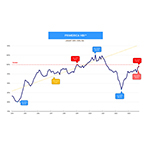Sign up for daily news updates from CleanTechnica on email. Or follow us on Google News!
Global heating is not something that is on everyone’s radar. Recently at the CERAWeek annual confab to celebrate fossil fuels, industry cheerleaders high-fived and chest bumped each other over the spectacular profits they see coming their way in the future. As usual, those companies have gamed the system so that the profits flow into their corporate coffers while the costs fall on the eight billion people who inhabit the Earth at present.
On April 17, 2024, researchers from the highly respected Potsdam Institute for Climate Impact Research (PIK) in Germany published a study that projects the damage from global heating will suck $38 trillion a year out of the global economy by the middle of this century. Researchers have a problem when they conduct such studies — communicating their message clearly so people or ordinary intelligence can understand what they are saying. In order for research to be validated by other researchers — an essential component of scientific endeavor — it has to be written in scientific jargon. Unfortunately, most of us are not familiar with that jargon, so it is intimidating and makes us feel we are not smart enough to understand it. Therefore we ignore it.
There is an apocryphal story of two members of Congress who have just finished listening to a scientist explain something to their committee. When the presentation was over, one turned to the other and asked, “Did you understand any of that?” The other one said, “Nope, not a word of it.” So the information the scientist wanted to share with them never got acted on because no one understood it. To quote the Captain in the movie Cool Hand Luke, “What we have here is a failure to communicate.” At CleanTechnica, we try to make the news accessible to our readers, who are all above average. So first we are going to quote from the study itself and then provide some context from other sources. The researchers wrote:
Projections of the macroeconomic damage caused by future climate change are crucial to informing public and policy debates about adaptation, mitigation and climate justice. On the one hand, adaptation against climate impacts must be justified and planned on the basis of an understanding of their future magnitude and spatial distribution. This is also of importance in the context of climate justice, as well as to key societal actors, including governments, central banks and private businesses, which increasingly require the inclusion of climate risks in their macroeconomic forecasts to aid adaptive decision-making.
On the other hand, climate mitigation policy such as the Paris Climate Agreement is often evaluated by balancing the costs of its implementation against the benefits of avoiding projected physical damages. This evaluation occurs both formally through cost–benefit analyses as well as informally through public perception of mitigation and damage costs.
Projections of future damages meet challenges when informing these debates, in particular the human biases relating to uncertainty and remoteness that are raised by long-term perspectives. Here we aim to overcome such challenges by assessing the extent of economic damages from climate change to which the world is already committed by historical emissions and socio-economic inertia (the range of future emission scenarios that are considered socio-economically plausible).
Such a focus on the near term limits the large uncertainties about diverging future emission trajectories, the resulting long term climate response, and the validity of applying historically observed climate–economic relations over long timescales during which socio-technical conditions may change considerably. As such, this focus aims to simplify the communication and maximize the credibility of projected economic damages from future climate change.
Their research suggests that global heating will inflict economic losses on the global economy of $38 trillion a year by 2049 as extreme weather ravages agricultural yields, harms labor productivity, and destroys infrastructure. In addition, global warming will result in an income reduction of 19% worldwide by mid-century, compared to a global economy without climate change, The paper uses data from more than 1,600 regions worldwide over the past 40 years to assess future impacts of a warmer planet on economic growth.
“Climate change will cause massive economic damages within the next 25 years in almost all countries,” Leonie Wenz, the scientist at PIK who led the study, told Bloomberg Green. “We have to cut down our emissions drastically and immediately. If not, economic losses will become even bigger in the second half of the century, amounting to up to 60% on global average by 2100.”
The researchers said cutting emissions and limiting global warming to 2º C by the end of the century would be the most cost effective way to reduce further climate damages. “Protecting our climate is much cheaper than not doing so, and that is without even considering non-economic impacts such as loss of life or biodiversity,” Wenz said. “We will need more adaptation efforts if we want to avoid at least some of them.”
Countries least responsible for climate change are predicted to suffer an income loss 60% greater than the higher income countries and 40% greater than higher emission countries, according to the report. Those nations also have the fewest resources available to adapt to the impacts of global heating and economic losses of the warming will be felt everywhere and “also in highly-developed ones such as Germany, France and the United States,” Wenz said. Only regions at very high latitudes will benefit from hotter temperatures.
The magnitude of the economic damages exceeds previous estimates because it takes into account not just temperature increases but also additional climate variables like extreme rainfall and impacts of extreme weather events on agriculture and labor productivity, as well as human health. “Structural change towards a renewable energy system is needed for our security and will save us money,” said Anders Levermann, a co-author of the study. “Staying on the path we are currently on will lead to catastrophic consequences.”
Bill McKibben Weighs In On Global Warming
Bill McKibben, predictably, is outspoken about the PIK research. He reminds readers of Limits to Growth, a report from the early 1970s which predicted that without serious efforts to change our demands on the planet, economic growth would begin to suffer in the first part of the 21st century. “We thought about it as a society and then, with the election of Ronald Reagan, rejected it. We are now harvesting that bitter fruit,” he writes.
He also says “capitalism — which regularly acts homicidally — is acting truly suicidally. Having been warned for years now, it resists every effort to rein in its excesses. As Exxon’s CEO helpfully explained earlier this year, it’s not that you couldn’t make good money from renewable energy, you just couldn’t make ‘above average returns’ because sunshine is free. So instead we’ll tank the world, and with it the world economy.”
This week, new research makes it clear that American banks are jumping into fossil fuel lending with both feet. It’s not just the mega banks doing it. Regional banks are getting in on the act as well, spurred on by the anti-ESG policies that have been created by several red States. BOK Financial in Oklahoma recently become one of the world’s 30 busiest deal makers in fossil fuels. Marisol Salazar, a senior vice president, says the bank is now seeing “much more opportunities” in the fossil fuel industry. “We’re not just picking up customers, We’re also picking up talent, we’re picking up engineers, we’re picking up investment bankers, we’re picking up experienced relationship managers.”
The Carbon Bankroll 2.0 report released recently made it clear that for many companies — Apple, Amazon, and Microsoft, among others — the bulk of their carbon emissions are related to the cash they keep on deposit in banks that lend it out to build more fossil fuel infrastructure. Here’s the major conclusion of that report:
If the largest banks and asset managers in the U.S. were a country, they would be the third-largest emitting country in the world, behind only China and the US.
If Amazon and Apple and Microsoft wanted to avoid a world where, by century’s end, people had 60% less money to spend on buying the products they plan on selling, they should be putting pressure on their banks to stop making the problem worse, McKibben says. They should also be unleashing their lobbying teams to demand climate action from Congress. “These people are supposed to care about money. It would help us if they actually did. Stop putting out ads about how green your products are — start making this system you dominate actually work,” he pleads, adding that the people who dominate the financial system have an obligation to make it work, if only out of their own self interest.
Todd Stern, a longtime American climate negotiator, said in a speech last week, “We are slowed down by those who think of themselves as grownups and believe decarbonization at the speed the climate community calls for is unrealistic. They say that we need to slow down, that what is being proposed is unrealistic. You see it a lot in the business world too. It’s really hard [to push for more urgency] because those ‘grownups’ have a lot of influence.”
 Chip in a few dollars a month to help support independent cleantech coverage that helps to accelerate the cleantech revolution!
Chip in a few dollars a month to help support independent cleantech coverage that helps to accelerate the cleantech revolution!
A Thought From Mark Z. Jacobson
Mark Z. Jacobson is a professor of civil and environmental engineering at Stanford University and director of its Atmosphere/Energy Program. Mark is a good friend of CleanTechnica. He has participated in several podcasts with Zachary Shahan and has graciously contributed his commentary on important climate stories like this one. I reached out to Mark to get his take on the PIK study and he told me in an email:
This study estimates that the economic cost of global warming may rise to $38 trillion per year by 2049. The economic cost is determined by considering the impacts of future temperature and rainfall changes on labor productivity, agricultural productivity, human health, and flood damage, among other factors. The estimate is close the $31.8 trillion per year estimated cost in 2050 due to global warming from another study that based its calculation on future estimates of emissions and on a metric called the social cost of carbon emissions that accounts for the same impacts.
Jacobson was the lead author of that report, which was published on June 28, 2022, by the Royal Society of Chemistry. It arrived at an estimate of the economic impact of global heating that is remarkably similar to the findings of the PIK researchers. And yet neither of these studies are front page news and almost no one has read them or taken their messages to heart.
We are sailing along toward a cliff and when we — the human community — go over that cliff, the economic pain will be fierce. If there are sentient beings from another planet watching what we are doing to our earthly home, they must be aghast by our self-destructive tendencies. Even an infant knows not to put a hand on a hot stove more than once, but we, who purport to be adults, cannot find the moral courage to find a path that leads away from the cliff we all know is coming.
Capitalism may be an efficient way to distribute economic resources, but it has metastasized to become a virus that will consume us all until there is nothing left. Viruses do not recognize limits. They simply feed on the corpus of their host until both die. Unless we alter our model of capitalism to take into account the costs of a degraded climate, things are not going to end well for humanity.
Have a tip for CleanTechnica? Want to advertise? Want to suggest a guest for our CleanTech Talk podcast? Contact us here.
Latest CleanTechnica.TV Video
CleanTechnica uses affiliate links. See our policy here.





